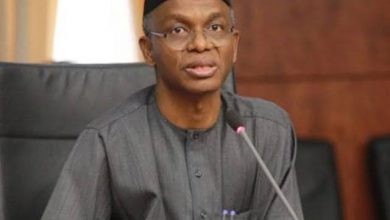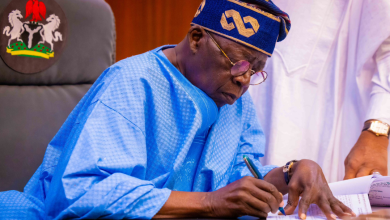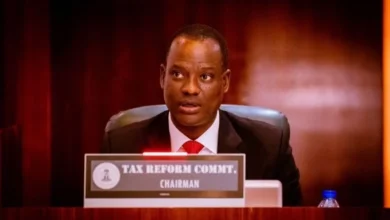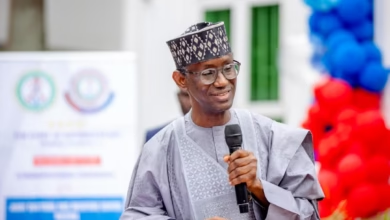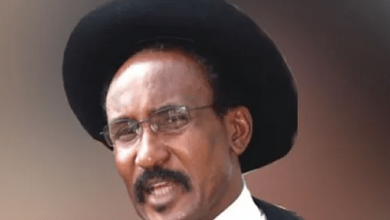Politics
SPECIAL REPORT: Who is Who In the ADC, Nigeria’s Coalition Party and its Key Players
By Dayo Dare
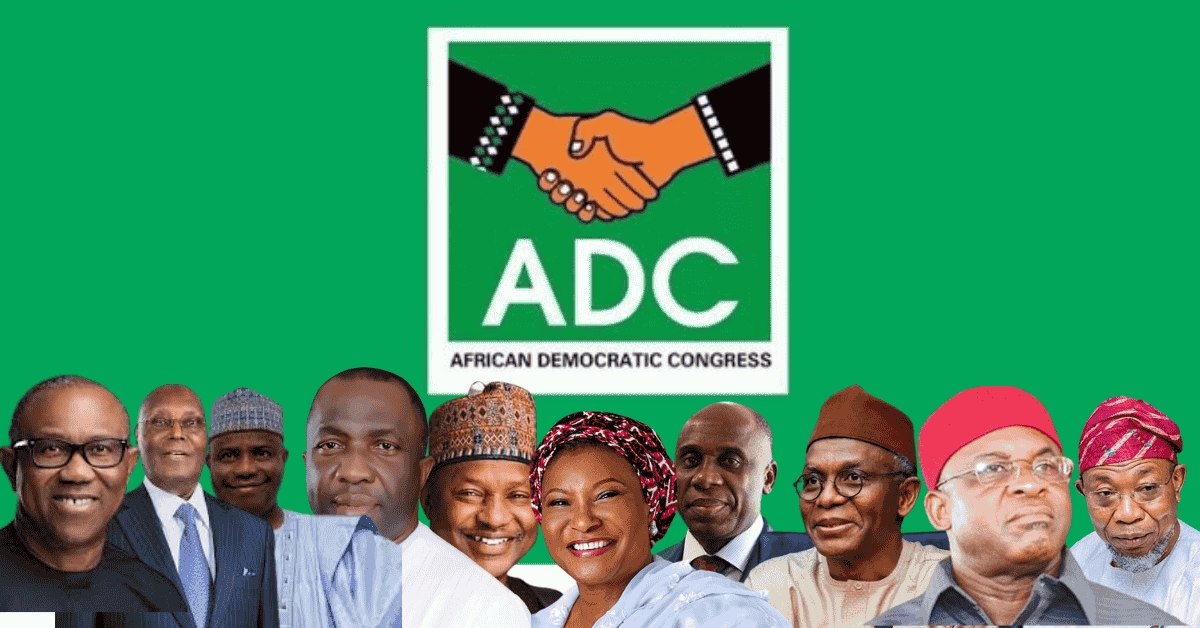
In a bid to oppose the ruling party and position itself as a credible opposition platform, the African Democratic Congress (ADC) has joined the coalition and brought several influential political figures into its ranks. The party appointed respected statesmen such as former Senate President David Mark and former Osun State Governor Rauf Aregbesola as interim leaders.
David Mark, widely recognized for his national influence, was named Interim National Chairman, while Aregbesola—an ex-governor, former Minister of Interior, and long-standing APC figure—was appointed Interim National Secretary. Other notable appointments include Chief Anayo Arinze as Interim Deputy National Chairman (South), Alhaji Ibrahim Manzo (North), and former Sports Minister Bolaji Abdullahi as Interim National Publicity Secretary.
David Mark: A Seasoned Political Veteran
David Mark, the ADC’s new interim national chairman, stands as one of Nigeria’s most enduring political influencers. He served as Minister of Communication under General Ibrahim Babangida’s regime, where he oversaw the digitization of Nigeria’s telecommunications sector. He also served as Military Governor of Niger State and retired from the army as a Brigadier General before moving into democratic politics.
In 1999, Mark was elected Senator representing Benue South. He remained in the Senate until 2007, when he became Senate President. His tenure is remembered for its stability and absence of scandal, making him one of Nigeria’s longest-serving Senate Presidents.
Among his major contributions was leading the Senate during the Doctrine of Necessity, which empowered Vice President Goodluck Jonathan to become Acting President during President Yar’Adua’s extended medical absence. Mark also championed electronic voting, biometric registration, and upheld the principle of separation of powers.
Rauf Aregbesola: Grassroots Reformist
Aregbesola’s political activism started during his university days and later extended to NADECO, the pro-democracy movement that fought for the restoration of democracy after the annulment of the June 12, 1993 election.
After a long legal battle, he was declared the rightful winner of the 2007 Osun State governorship election. During his two-term tenure, he introduced policies like the Opon Imo (Tablet of Knowledge), a solar-powered educational device. He also launched a school feeding program, initiated the Osun Rural Access and Mobility Project (RAMP), and rolled out O-YES, a youth job creation initiative that engaged over 40,000 people. He also established a welfare scheme for the elderly.
As Minister of Interior, he modernized passport issuance and reformed prison management, including building new correctional facilities.
Other key political actors to align with ADC include:
Atiku Abubakar: Business Tycoon
Atiku Abubakar has been a dominant force in Nigerian politics since 1989 when he worked with Shehu Musa Yar’Adua. He first ran for governor of the former Gongola State but lost. In 1999, he was elected governor of Adamawa State, but was soon tapped to serve as Vice President under President Obasanjo on the PDP ticket.
During his time as Vice President, he oversaw the National Council on Privatization (NCP), which led the sale of many government-owned enterprises. His administration also reformed the telecom sector, enabling the GSM boom in Nigeria. He founded several businesses in Adamawa, including Prodeco, Adamawa Beverages, and the American University of Nigeria (AUN).
Atiku’s political career has seen him move across party lines. He ran for president under the Action Congress in 2007, returned to the PDP in 2010, moved to the APC in 2014, then back to the PDP in 2017. He has contested for president six times, most recently in 2023. His interest in the coalition is widely believed to be another strategic move for a presidential bid.
Nasir El-Rufai: Public Policy Expert
El-Rufai rose from the private sector to become economic adviser during General Abdulsalami Abubakar’s regime. In 1999, he was appointed DG of the Bureau of Public Enterprises (BPE) under President Obasanjo and later became Minister of the FCT.
He implemented strict urban reforms in Abuja using the city’s master plan. He also tackled land corruption by introducing the Abuja Geographic Information System (AGIS). Though he went silent during President Yar’Adua’s administration, he returned under Jonathan, becoming a vocal critic of the PDP.
El-Rufai helped form the APC and was elected governor of Kaduna State. As governor, he introduced education reforms by sacking unqualified teachers, offered free basic education, renovated schools, and upgraded infrastructure across the state.
Peter Obi
Obi first ran for Anambra State Governor in 2003 under APGA. The Court of Appeal later declared him the rightful winner in 2006. He chaired the Securities and Exchange Commission under President Jonathan and was Atiku’s running mate in 2019. He later joined the Labour Party and ran for president in 2023, gaining massive youth support.
As governor, he left $156 million in dollar bonds and investments. He equipped 500+ schools with internet and over 30,000 computers, distributed 700+ school buses, built over 900 km of roads and bridges, and provided vehicles to all 177 communities. Crime significantly reduced during his administration.
Bolaji Abdullahi
A former journalist, Abdullahi started in politics as Special Assistant to Governor Bukola Saraki. He became Kwara State Commissioner for Education and launched the “Every Child Counts” reform. He trained 20,000+ teachers, set up the first Quality Assurance Bureau, and led World Bank-backed education programs.
He later became Minister of Youth Development and then Minister of Sports under Jonathan. Nigeria won the 2013 AFCON under his leadership. He served as APC’s National Publicity Secretary but resigned in 2018 and returned to PDP. In 2024, he resigned from PDP and has now aligned with the ADC coalition.
Rotimi Amaechi
Amaechi began as SA to Deputy Governor Peter Odili, later became Speaker of the Rivers State House of Assembly, and won a legal battle to become governor. As governor, he built over 500 modern schools, hired 13,200 teachers, revamped healthcare, constructed the Adokiye Amiesimaka Stadium, and developed tourism and infrastructure.
As Minister of Transportation, he revived rail lines like Lagos–Ibadan, Abuja–Kaduna, and Itakpe–Warri. He also pushed for the development of Lekki Deep Seaport, projected to add $360 billion to the GDP.
Dino Melaye
Melaye led NANS and later chaired the Presidential Advisory Council on Youths under Obasanjo. He served in the House of Representatives and then as Senator for Kogi West. He chaired committees on FCT and Aviation. After switching back to PDP in 2019, he won the Kogi governorship primary in 2023 but came third in the general election.
Aminu Tambuwal
Tambuwal served as Deputy Chief Whip and later Speaker of the House of Representatives, where he oversaw the passage of 123 bills and 819 motions. He became Governor of Sokoto State under APC in 2015, defected to PDP in 2018, and was re-elected governor in 2019.
As governor, he emphasized girl-child education, declared an education emergency, signed the Right to Education Bill, and consistently allocated over 24% of the state’s budget to education.
Solomon Dalung
Dalung was PA to Solomon Lar and later served as Langtang South LGA chairman. He became Minister of Youth and Sports in 2015. Under him, Nigeria’s D’Tigress won the AfroBasket Women’s Championship and reached the FIBA World Cup quarter-finals. The Super Eagles qualified early for the 2018 World Cup. He supported grassroots football and facilitated job placements for Plateau youths.
Dele Momodu
Chief Dele Momodu was a strong voice during the June 12 struggle and a member of NADECO. Arrested in 1995 for treason, he escaped into exile and returned after Abacha’s death. He launched Ovation TV and later The Boss Newspaper.
He ran for president in 2011 under the NCP. In 2021, he joined PDP and declared his intention to run again.
Gabriel Suswam
Suswam started in the House of Representatives in 1999 and chaired several powerful committees. He became Governor of Benue State in 2007 and was re-elected in 2011. He initiated the “Our Benue, Our Future” plan, which improved roads, water projects, rural electrification, health centers, and schools.
Ireti Kingibe
Ireti joined politics in the 1990s as an adviser in SDP. After several unsuccessful senate bids under ANPP, PDP, and APC, she joined the Labour Party in 2022 and won the FCT Senate seat in 2023, defeating incumbent Philip Aduda.
She is currently Chair of the Senate Committee on Women Affairs and has sponsored key bills on gender-based violence, security, maternal care, and education in the FCT.
Emeka Ihedioha
Ihedioha began as press officer to the Senate President in 1992. He served in several roles, including SA to the Vice President. Elected to the House in 2003, he served three terms and held positions like Chief Whip and Deputy Speaker. He became governor of Imo State in 2019 and introduced fiscal reforms like TSA, CBS, and Open Government initiatives.
AVM Abubakar Sadique
Air Marshal (Retired) Sadique Baba Abubakar held key leadership roles within the Nigerian Air Force, including Chief of Standards and Evaluation, Chief of Defence Communications, Air Officer Commanding Training Command, and Chief of Administration at NAF Headquarters, before his appointment as Chief of the Air Staff in 2015. During his tenure, he expanded both manpower and infrastructure within the Air Force, oversaw the acquisition of several aircraft, established new commands, and improved welfare through over 1,000 infrastructure projects, including housing, schools, and hospitals for personnel.
After his military service, he was appointed Nigeria’s Ambassador to Chad, a role he later resigned from to pursue his political ambitions in Bauchi State. In 2022, he won the APC governorship primary in Bauchi. He later moved to the African Democratic Congress (ADC) and is now actively attending its inaugural meetings.
Abubakar Malami
Abubakar Malami, SAN, served as National Legal Adviser to the Congress for Progressive Change (CPC) before its merger into the APC. He also chaired the party’s legal team during the 2011 presidential campaign. In 2014, he vied for the APC governorship ticket in Kebbi State but stepped down in favor of Atiku Bagudu during the primaries.
Malami was later appointed Attorney General of the Federation and Minister of Justice by President Muhammadu Buhari, becoming the youngest member of the cabinet at age 48. He was reappointed in 2019.
During his tenure, he coordinated Nigeria’s anti-corruption strategy, led the recovery of over $300 million in stolen Abacha loot from the U.S. and Jersey, and defended Nigeria in the Interocean Oil arbitration case, saving the country around $1.5 billion. He also spearheaded major reforms, including the Proceeds of Crime Act, the Mutual Legal Assistance Bill, the National Anti-Corruption Strategy, and various asset recovery frameworks.
In the justice sector, he oversaw the development of the National Judicial Policy, chaired multiple presidential committees, and pushed for the implementation of the Administration of Criminal Justice Act (ACJA) to speed up legal processes and reduce prison overcrowding.
Datti Baba-Ahmed
Yusuf Datti Baba-Ahmed was elected to the House of Representatives representing Zaria Federal Constituency under the ANPP, where he stood firmly against corruption and opposed President Obasanjo’s third-term agenda. He didn’t seek re-election in 2007 and returned to private sector ventures. In 2011, he ran for the Senate under the CPC and won the Kaduna North seat, but his tenure was cut short when the tribunal awarded the seat to Ahmed Makarfi.
He founded Baze University in Abuja in 2011, where he continues to serve as Pro-Chancellor. In 2022, he withdrew from the PDP governorship primaries in Kaduna State and later joined the Labour Party, where he was unveiled as Peter Obi’s running mate in the 2023 presidential election.
Enyinnaya Harcourt Abaribe
Enyinnaya Abaribe began his political career in 1999 as Deputy Governor of Abia State under Governor Orji Uzor Kalu. He served until 2003 but resigned after surviving multiple impeachment attempts.
In 2003, he contested the governorship under the ANPP but lost. He later joined the PDP and, in 2007, was elected Senator for Abia South.
In the Senate, Abaribe served as Chairman of the Committee on Media and Public Affairs and later as Senate Minority Leader. He co-sponsored key motions on national security, restructuring, and electoral reform, and was a strong voice during the #EndSARS protests, advocating for justice and police accountability.
He left the PDP in 2022 and joined the All Progressives Grand Alliance (APGA), under which he won re-election in 2023.
Uche Secondus
Prince Uche Secondus began his political journey in 1978 as Rivers State Youth Leader for the National Party of Nigeria (NPN). During the Third Republic, he served as Publicity Secretary of the National Republican Convention (NRC) in the state.
In 2002, he became Chairman of the Rivers State PDP, serving two terms until 2008 and earning the nickname “Total Chairman” for his firm leadership and grassroots appeal.He was appointed South-South Coordinator for the PDP National Campaign Council during the 2007 elections and was later promoted to National Organizing Secretary in 2008.
In 2013, he was elected Deputy National Chairman of the PDP and briefly served as Acting National Chairman following the resignation of Adamu Mu’azu.
Kenneth Okonkwo
Kenneth Arinzechukwu Okonkwo ran for a seat in the House of Representatives under the PDP in 2011 but lost. In 2022, he resigned from the APC and joined the Labour Party, declaring his support for Peter Obi.
He was appointed national spokesperson for the “Dynamics Ambassadors for Peter Obi” (DAPO) and later became the official Labour Party spokesperson during the 2023 presidential campaign. He didn’t hold back in criticizing the party’s leadership, calling it “a secret society led by a group of clowns.”
In 2025, he formally resigned from the Labour Party but reaffirmed his commitment to good governance. He expressed interest in aligning with like-minded Nigerians, possibly paving the way for his involvement in the ADC.
Ralph Nwosu
Ralph Okey Nwosu founded the African Democratic Congress (ADC) and served as its pioneer and longest-serving National Chairman. He also led the Inter-Party Advisory Council (IPAC) and chaired its Central Management Committee in 2020, where he pushed for reforms in political accountability.
In 2018 and 2019, he played a key role in the formation of the Coalition of United Political Parties (CUPP), aiming to unseat the APC and President Buhari. He also merged ADC with the Coalition of Nigeria Movement (CNM), initiated by former President Olusegun Obasanjo.
In 2022, Nwosu openly criticized the Buhari administration over a nationwide blackout, citing poor infrastructure and failed leadership. He remains a strong voice within the ADC as it positions itself as part of a broader opposition coalition.
The ADC’s recruitment of high-profile, reform-driven leaders like David Mark and Rauf Aregbesola marks a strategic shift toward national relevance. With a leadership bench full of seasoned professionals, the party is positioning itself as a serious opposition force.

